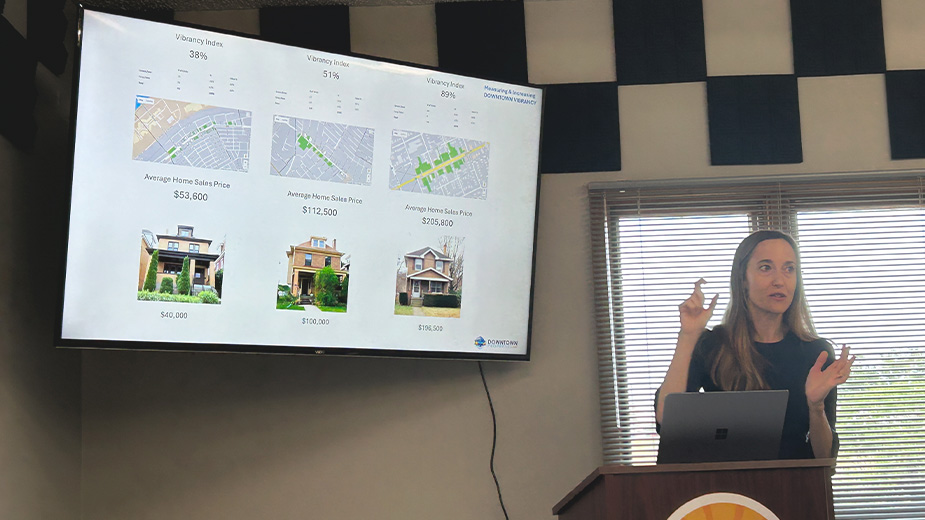Ohio River Valley Institute Launched to Promote Clean Energy Economy
PITTSBURGH — The Ohio River Valley Institute, a newly established think tank, was unveiled today with the mission of achieving job growth by embracing the clean energy economy.
The Institute’s focus is the Appalachian regions of Ohio, Pennsylvania, West Virginia, and Kentucky. The goal, organizers say, is to equip residents and decision makers with in-depth research, analysis, and commentary to advance long-term solutions to some of Appalachia’s most pressing economic and social challenges.
“The need for new, evidence-based perspectives on public policy is acute in a region where purported economic game-changers, including the natural gas fracking boom and a proposed build-out of the petrochemical and plastics industries, have conspicuously failed to deliver on promises of jobs and prosperity,” the institute states in its announcement. “Meanwhile, other regions of the country, which have embraced the emerging clean energy economy and more inclusive policymaking, have experienced healthy growth in jobs and commerce.”
Joanne Kilgour, the Institute’s executive director, formerly the Pennsylvania chapter director for the Sierra Club, sites New England, Texas and the Northwest as diverse regions that saw “excellent jobs and economic growth before the coronavirus crisis. Learning from those experiences can help us reverse the employment stagnation and population decline, which have plagued the greater Ohio Valley and western Pennsylvania since the dawn of the fracking boom,” he says.
“We’ve spoken with economists, policy analysts, and community leaders who agree that a massive build-out of polluting industries isn’t a plausible economic strategy and that pursuing it will squander public resources that could be better used to develop better options,” Kilgour says.
That view was expressed by a group of economists and a former Pennsylvania secretary of environmental protection in a recently released public letter to the governors of Ohio, Pennsylvania, and West Virginia. The organizer of that letter, Sean O’Leary, will serve as a senior researcher at the Institute.
“A decade ago, policymakers failed to recognize economic factors that are devastating the coal industry and turning the fracking boom into a sea of red ink. Now, they’re in danger of doing the same in their efforts to promote a vision of fossil fuel and petrochemical growth that isn’t supported by the economics,” said O’Leary who comes to the Ohio River Valley Institute from the NW Energy Coalition.
Ted Boettner, founder and executive director of the West Virginia Center on Budget and Policy, who also serves as a senior researcher for the Institute, says he sees an opportunity for prosperity through a combination of innovative fiscal and economic policies and the development of clean energy resources.
“I’ve worked with great people devising policies that have the potential to increase incomes, commerce, and jobs not just in West Virginia, but in the region. The Institute represents an opportunity to bring those ideas together in a vision and blueprint for policymakers,” says Boettner. “For a long time, we’ve been swimming against the tide by relying heavily on failing fossil fuel industries. This is our chance to swim with the tide while also achieving just transitions for workers and communities that are being damaged by the decline of those industries.”
The fourth member of the team, Eric de Place, will serve as a research fellow. He is on the staff of Sightline Institute in the Pacific Northwest, known for its “Thin Green Line” initiative that played a critical role in reducing global fossil fuel consumption by blocking new coal, oil, and gas infrastructure on the West Coast.
“Good environmental policy is great economic policy,” states de Place. “We’ve seen how energy efficiency and renewable portfolio standards, clean energy investments, and other measures stimulate the economy and jobs growth, cut energy costs, and reduce pollution and greenhouse gas emissions. We can destroy the myth that there’s a tradeoff between jobs and the environment.”
Ohio River Valley Institute staff members will seek regular input on economic, technology, and equity issues from an advisory board that includes:
- John Russo, visiting scholar at Georgetown University and professor emeritus at Youngstown State University
- Anthony Ingraffea, professor emeritus of Civil Engineering at Cornell University
- Jill Kriesky, former senior project coordinator at the University of Pittsburgh Graduate School of Public Health
- Lou Martin, associate professor of history at Chatham University
- Matthew Mehalik, adjunct professor of environmental policy at Heinz College, School of Public Policy and Management, Carnegie Mellon University
- Nicholas Muller, associate professor of economics, engineering, and public policy at Carnegie Mellon University
- Mark Partridge, professor of economics and Swank Chair of Rural and Urban Policy at The Ohio State University
- Mark Paul, assistant professor of economics and environmental studies at the New College of Florida
- Heather Stephens, associate professor of resource economics and Management at West Virginia University
- Monica Unseld, founder at Data for Justice and director of community engagement at the Greater Louisville Project
- James Van Nostrand, director of the Center for Energy and Sustainable Development and professor of law at West Virginia University
- Amanda Weinstein, assistant professor of economics at the University of Akron
- Jaimie Worker, senior state policy coordinator at the Economic Policy Institute
In addition to issuing policy whitepapers and studies, the Ohio River Valley Institute will maintain a blog on its website to address current issues, and will host and facilitate webinars and symposia to bring together policymakers and experts to explore and develop solutions.
SOURCE: Ohio River Valley Institute.
Image: Hertz Scenic Trip Planner
The Institute website and contact information for staff members may be found at .
Published by The Business Journal, Youngstown, Ohio.



